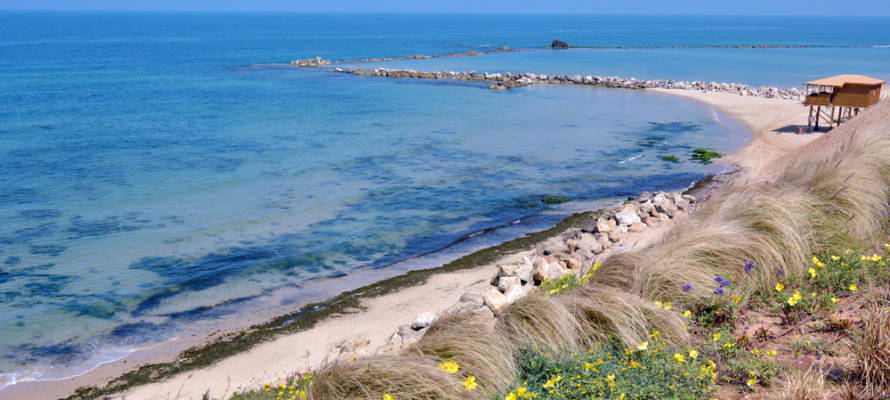The oldest coastal defense structure ever identified has been found off the coast of northern Israel!
By United with Israel Staff
Archaeologists recently discovered a millennia-old sea wall dating back to the stone age, which stretches more than 330 feet (100 meters) long was intended to protect settlements as sea levels rose. The findings were published in the journal PLOS ONE on Wednesday.
“The underwater archaeological site has yielded well-preserved architectural, artefactual, faunal and human remains,” said the report. “Based on archaeological context, mode of construction and radiometric dating, we demonstrate the feature was contemporary with the inundated Neolithic settlement and conclude that it served as a seawall, built to protect the village against Mediterranean Sea-level rise.”
The impressive wall, which is designed as a zigzag and constructed with several different building styles, was intended to protect nearby inhabitants from rising water. It was not attached to any domestic structures.
It is assumed to be part of the the submerged Tel Hreiz settlement, first explored in the 1960s. In 2012 and 2015, following powerful storms, large sections of the settlement were exposed.
Among the structures revealed were “archaeological material extending from the current coastline to a depth of 4m below MSL [sea level]…The wall is constructed mostly of large boulders of kurkar (the local term for aeolianite) and some of limestone that are up to 50 to 100 cm in width, 100 cm in height and weigh 200–1000 kg each. The boulders are naturally rounded to sub-rounded and were not cut or quarried.”
“Its length, use of large non-local boulders and specific arrangement in the landscape reflect the extensive effort invested by the Neolithic villagers in its conception, organisation and construction,” wrote PLOS ONE.
The lead author was Ehud Galili, a marine archaeologist at the University of Haifa in Israel. Other researchers include Jonathan Benjamin and John McCarthy from Flinders University in Adelaide, South Australia, Vered Eshed from the Israel Antiquities Authority, Baruch Rosen of Agricultural Research Organization ARO, and Liora Kolska Horwitz from Hebrew University.
Archaeologists believe that the findings represent a single time period of a sedentary community that lived in the area for only about 300-500 years. Tel Hreiz represents just one, small village. There are at least 15 submerged Neolithic villages off Israel’s northern coast.
“It was deliberately built by the Neolithic villagers and was intended to protect the settlement from waves and marine erosion following post-glacial sea-level rise,” wrote the researchers.
The seawall failed to protect the settlement, according to the report.
Bring Joy to Israeli Soldiers - Send Winter Care Packages!
We are honored to thank the young men and women of the IDF who risk their lives every day to defend the citizens of Israel.
Join us in sending winter care packages and personal notes of support to Israeli soldiers who are out in the cold all day.
Warm up a soldier's heart with essential winter wear including fleece jackets, hats, gloves and more. Keep an entire unit warm!
THE SOLDIERS REALLY APPRECIATE YOUR LOVE AND CONCERN!
Click Here to Send Your Gift and Personal Note to Israeli Soldiers
Do You Love Israel? Make a Donation - Show Your Support!
Donate to vital charities that help protect Israeli citizens and inspire millions around the world to support Israel too!
Now more than ever, Israel needs your help to fight and win the war -- including on the battlefield of public opinion.
Antisemitism, anti-Israel bias and boycotts are out of control. Israel's enemies are inciting terror and violence against innocent Israelis and Jews around the world. Help us fight back!
























